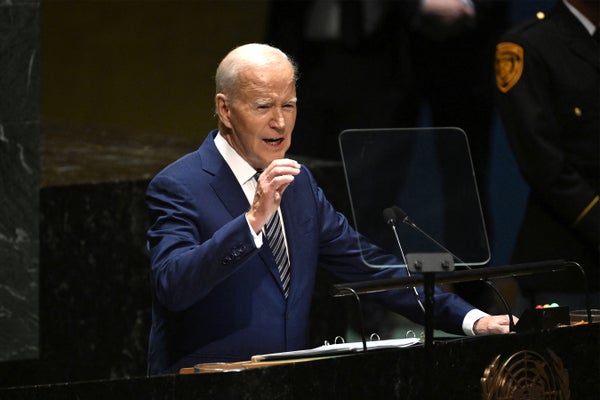CLIMATEWIRE | The Biden administration announced plans Thursday to consider climate costs in a much broader swath of government policies and decisions than ever before — including how the federal government wields its massive buying power.
The social cost of greenhouse gases — a metric for the climate damage done by a ton of carbon dioxide or methane as it enters the atmosphere — has been a regulatory staple for years. But on Thursday the president ordered agencies to get ready to use it consistently in a host of other government activities — including annual budgets, permitting decisions and foreign assistance programs.
Biden also asked agencies to start laying the groundwork to build climate costs into government procurement.
On supporting science journalism
If you're enjoying this article, consider supporting our award-winning journalism by subscribing. By purchasing a subscription you are helping to ensure the future of impactful stories about the discoveries and ideas shaping our world today.
“As the world’s single largest purchaser — spending over $630 billion per year on goods and services — the federal government has the ability to move markets, invest in new ideas, and act as a model contracting partner,” the White House said in a statement.
In the short term, it said, considering the social cost of climate change would save taxpayers money by reducing federal energy bills. In the longer term, it would help stave off "the most catastrophic effects of the climate crisis.”
The Federal Acquisition Regulatory Council, or FAR Council, which oversees federal procurement policy, proposed a new rule in August that would direct agencies to purchase sustainable products and services when they’re available. It is expected to finalize a rule later this year that would require federal contractors to disclose their greenhouse gas emissions. “Major” contractors would also need to account for their suppliers’ emissions.
And the council — which includes procurement officials from the Defense Department, NASA and the General Services Administration — is seen to be drafting a rule for how agencies would build the social cost of greenhouse gas emissions into all procurement decisions.
Thursday’s executive order noted that those actions are yet to come. But it asked agencies to start incorporating social cost figures when buying “large, durable, energy-consuming products and systems” — like U.S. Postal Service delivery vehicles.
“Such pilots will help agencies build the capacity and repeatable methods needed to replicate successes as they more broadly integrate the [social cost of greenhouse gases] into federal procurement decisions over time,” it stated.
The directive also called on agencies to consider harm to the climate when they fine violators for breaking the law or for regulatory infractions where that is "appropriate and consistent with their authorities.”
Sen. Sheldon Whitehouse (D-R.I.), who has long advocated for the social cost metrics to be used more broadly by federal agencies, called the directive "a very big deal."
"By incorporating the social cost of carbon into procurement calculations, today’s action will result in economies of scale for clean energy and low-emission products, bringing down prices for consumers," he said in a statement.
But West Virginia Sen. Shelley Moore Capito, the top Republican on the Senate Environment and Public Works Committee, called the metrics “unproven figures” the administration used “to justify its environmental policies that drive up costs for families, hamstring American employers and delay job-creating infrastructure projects from ever moving forward.”
This story first appeared in E&E News PM.
Reprinted from E&E News with permission from POLITICO, LLC. Copyright 2023. E&E News provides essential news for energy and environment professionals.
